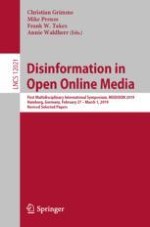2020 | OriginalPaper | Buchkapitel
Use and Assessment of Sources in Conspiracy Theorists’ Communities
verfasst von : Tim Schatto-Eckrodt, Svenja Boberg, Florian Wintterlin, Thorsten Quandt
Erschienen in: Disinformation in Open Online Media
Aktivieren Sie unsere intelligente Suche, um passende Fachinhalte oder Patente zu finden.
Wählen Sie Textabschnitte aus um mit Künstlicher Intelligenz passenden Patente zu finden. powered by
Markieren Sie Textabschnitte, um KI-gestützt weitere passende Inhalte zu finden. powered by
